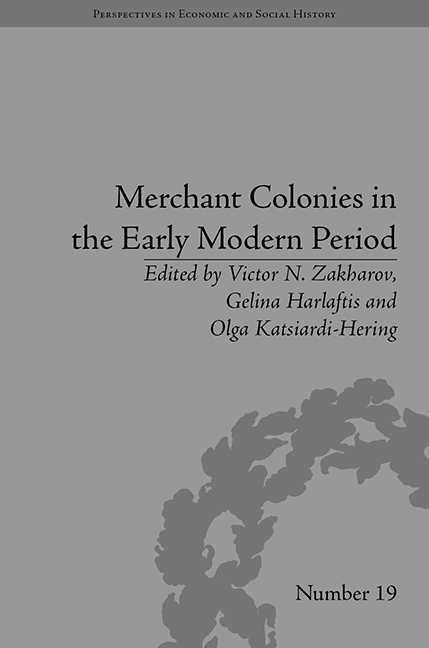Book contents
- Frontmatter
- Contents
- List of Figures and Tables
- List of Contributors
- Introduction
- 1 Early Modern English Merchant Colonies: Contexts and Functions
- 2 German and Italian Merchant Colonies in Early Modern England
- 3 Dynamism and Integration of the North European Merchant Communities in French Ports in the Eighteenth Century
- 4 Opportunity and Legislation: How the Armenians Entered Trade in Three Mediterranean Ports
- 5 Russian Merchant Colonies in Seventeenth-Century Sweden
- 6 Foreign Merchant Communities in Eighteenth-Century Russia
- 7 Greek Merchant Colonies in Central and South-Eastern Europe in the Eighteenth and Early Nineteenth Centuries
- 8 Community for Commerce: An Introduction to the Nezhin Greek Brotherhood Focusing on its Establishment as a Formal Institution in the Years Between 1692 and 1710
- 9 Entrepreneurship at the Russian Frontier of International Trade. The Greek Merchant Community/Paroikia of Taganrog in the Sea of Azov, 1780s–1830s
- Notes
- Index
6 - Foreign Merchant Communities in Eighteenth-Century Russia
- Frontmatter
- Contents
- List of Figures and Tables
- List of Contributors
- Introduction
- 1 Early Modern English Merchant Colonies: Contexts and Functions
- 2 German and Italian Merchant Colonies in Early Modern England
- 3 Dynamism and Integration of the North European Merchant Communities in French Ports in the Eighteenth Century
- 4 Opportunity and Legislation: How the Armenians Entered Trade in Three Mediterranean Ports
- 5 Russian Merchant Colonies in Seventeenth-Century Sweden
- 6 Foreign Merchant Communities in Eighteenth-Century Russia
- 7 Greek Merchant Colonies in Central and South-Eastern Europe in the Eighteenth and Early Nineteenth Centuries
- 8 Community for Commerce: An Introduction to the Nezhin Greek Brotherhood Focusing on its Establishment as a Formal Institution in the Years Between 1692 and 1710
- 9 Entrepreneurship at the Russian Frontier of International Trade. The Greek Merchant Community/Paroikia of Taganrog in the Sea of Azov, 1780s–1830s
- Notes
- Index
Summary
Introduction
It is well known that in early modern time so-called colonies of foreign merchants developed in different parts of the world market and played a great role in organizing trade ties between west European countries and other regions of Europe. Russia was no exception to this process. In the Middle Ages Hanseatic merchants operated in Novgorod, while in fourteenth-century Moscow there appeared a corporation of gosti-surozhane (Surozh merchants), which included merchants of Greek and Italian origin. When the northern port of Arkhangelsk was founded in the sixteenth century, English, Dutch and Hamburg merchants used it to access the Russian market. Besides, Russia had long-standing trade relations with its neighbours in the south-west, south and south-east, causing groups of merchants to form from Balkan countries, the Middle East, central and south Asia in different towns and regions of Russia. There were Indians in Astrakhan', Bukhara traders in south-western Siberia and Astrakhan', as well as Greeks, the most numerous colonies of whom were in Nezhin (Ukraine), and Armenians trading in many places such as Astrakhan', Moscow, Arkhangelsk and Taganrog.
What would we call these groups of foreign merchants? In western European tradition such associations of tradesmen far away from their native land are usually called ‘colonies’. In Russian sources and historiography, this term is rarely used in relation to foreigners living in Russia. Moreover in modern Russian, colonies are countries incorporated into empires and depending on other states.
- Type
- Chapter
- Information
- Merchant Colonies in the Early Modern Period , pp. 103 - 126Publisher: Pickering & ChattoFirst published in: 2014



